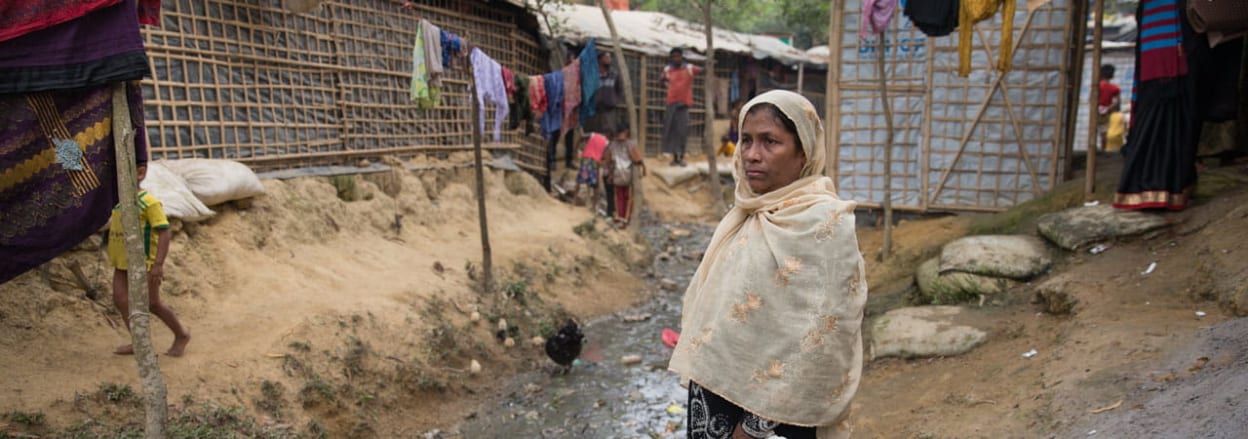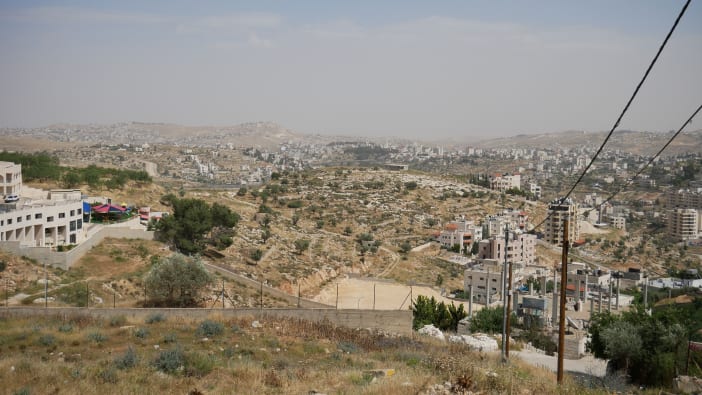The Rohingya Crisis: three years of living in cramped camps
Written by Tearfund | 26 Aug 2020



Written by
Written by Tearfund
In August 2017, hundreds of thousands of Rohingya people began fleeing violence in Myanmar. Three years later, many are still living in refugee camps in Bangladesh, surviving in extremely basic conditions.
Tearfund and our partners are supporting these people in a number of ways. But life has now become even more challenging now that coronavirus has arrived.
Tearfund’s News Editor, Andrew Horton, spoke with Sudarshan Kodooru, who leads Tearfund’s work in Bangladesh.
How are the Rohingya people coping today, three years after arriving in the Bangladesh camps?
Many of the Rohingya people arrived with physical injuries and psychological trauma, particularly the children and the women. They've gone through so much pain and suffering. And it stays with them for a long time.
Tearfund and our partners are providing psychological support and trauma care as well as building toilets, wash stations, wells, and child-friendly and women-friendly safe spaces. And yet the living conditions are still very poor. They’re living in very cramped and crowded camps where social distancing is very hard. Hygiene also becomes an issue as many lack adequate toilets, clean water supplies and drainage systems. This is what people are having to put up with.
And yet the people are not ready to move back to Myanmar, because they still feel the situation is not safe enough for them to go back to.
‘'They’re living in very cramped and crowded camps where social distancing is very hard.'’
How has coronavirus affected these camps?
When this Covid-19 outbreak began we talked about how it’s going to be catastrophic if it spread in the camps. But the number of cases in the camps in six months is just under 100. The Bangladeshi government, the UN, and charities like Tearfund have been carrying out an intensive response. We are raising awareness of the virus through leaflets in the local Rohingya language and talking to people. We’re also trying to continue with our work to build toilets, wells and sewage systems to help improve hygiene. This has helped to protect most people so far.
Do you think that it is primarily this intervention by the government, UN and charities like Tearfund that’s helped to keep the number of coronavirus cases down?
I would say definitely it has contributed to it. Unless somebody created that awareness and provided those hygiene and sanitation materials, continuously educating people on social distancing and cleanliness and all those things, they wouldn't have known what's happening and the dangers of coronavirus.
All the efforts of the humanitarian agencies, combined with the cooperation and the willingness of the people to receive and to practice this guidance, has led to a good result so far. Looking at the small number of cases in the camps many people in the humanitarian sector are saying this is either a miracle or a mystery.
So, what do you think? Is it a miracle or a mystery?
To me it still remains a mystery, because we all thought the numbers would be higher. But you know we cannot say for certain. Obviously the number of tests that are done in the camps are very limited, and we only have the number of cases that are being officially reported.
Looking at those camps and the crowded situation people are in, and the limitations on social distancing, it's a mystery how this has not spread like wildfire. But in another sense I would also say if the figures are true, then it's a miracle. It's a miracle, definitely.
While there is a reason to celebrate this, we must not become complacent and sit back. We must continue to intensify our efforts to help the Rohingya people fight the pandemic. I praise God and thank all of Tearfund’s supporters for their continued prayers and support for this.
How is morale for the Rohingya people in these camps, three years into this crisis?
This crisis has been overwhelming. They have scars both physical and psychological. And yet people are developing the resilience to continue to live, to continue to survive. They do appreciate the support that is being received, but of course the needs are huge.
How sustainable is it to live in these camps?
To live in the camps is not sustainable. I would not recommend anyone to live in the camps for a lifetime. No refugee should continue to be a refugee for a lifetime. They should have a life with dignity not always needing to look to somebody to support them. To restore human dignity is what is needed. People need to get settled – to have the freedom to study, to have the freedom to work and earn a living with dignity. This is what people want.
This crisis is not going to end in the next year or two. It will continue to be there for the next several years. How long? I can't say. But it's not going to end in the near future.
‘'Praise God for the way coronavirus has been kept under control.'’
How do you think God sees this crisis?
That's a very important question. We know God is concerned about people who are vulnerable. We serve a God who is on the side of the poor. He is with the destitute and the widows. You see in Exodus the people cried out and God heard them when they were slaves in Egypt. And it says God came down and delivered them.
Every human being is created in the image of God. And people deserve to live a life of dignity.
Tearfund and many like-minded agencies have a mandate from God as followers of Christ to respond not merely as humanitarian support but as a call from God.
We serve a God who cannot tolerate injustice. A God who does not ignore peoples suffering. We serve a God who is on the side of these destitute the poor and the vulnerable. I think we have a mandate as Tearfund, and a call.
How can Tearfund supporters respond and pray about this crisis?
Praise God for the way coronavirus has been kept under control. Thank God for the generous Bangladeshi government that is willing to accommodate the Rohingya people in their country. Praise God for so many humanitarian groups who are putting their own staff at risk in this response.
I would also ask supporters to continue to pray for the Rohingya people, and for the protection of Tearfund’s partner staff, for the protection of health facilities and for more resources.
Finally, I would like to say thank you to Tearfund supporters for their generous support. I know the people in the UK have also been going through this coronavirus crisis. And yet they have been supporting us. Please continue this.
Share this page
Share this page to spread the word and help support those in need.

Get our email updates
Learn about our work and stay in touch with Tearfund. Hear about our news, activities and appeals by email.
Sign up now - Get our email updates






